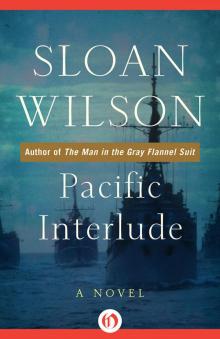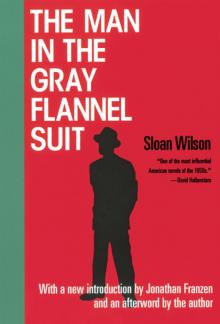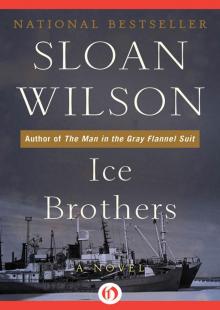- Home
- Sloan Wilson
Ice Brothers Page 28
Ice Brothers Read online
Page 28
“That doesn’t sound like Mowrey, but then, he’s always full of surprises. Where is your friend Schuman?”
“In his bunk, sir. He’s been on the bridge practically nonstop for weeks, and when Captain Mowrey fell overboard a few hours ago, Mr. Schuman jumped in to save him. He’s kind of beat.”
“Well, I was going to have a man flown from the States to replace Mowrey, but I’d be delighted if Mr. Schuman can take over. It’s not easy to find ice pilots.”
“No, sir.”
“We could make you exec and find you a new ensign. There’d be less delay that way. How would that strike you?”
“That would be fine, sir. But I have a request.”
“What’s that?”
“Is there any chance we could get radar?”
“Not a one. Every ship in the fleet wants it. It’s a brand new development and production isn’t geared up yet.”
“How about a radar detection device?”
“The same goes for that. Our supply guys don’t even know what that is.”
“Sir, if you’ll look at my record, you’ll see that I was in radar research and development at G.E. I could make a radar detection device if I could get the right materials and tools.”
“That’s very enterprising of you, but you know how the service works. If a ship doesn’t rate a certain kind of equipment, there’s no way you can draw it.”
“I know, but if we’re going up to the east coast to look for Germans, a radar detection device could make all the difference. If the Nanmak had had that …”
“The Nanmak had radar, but it wasn’t working.”
“I know, sir. I fixed it in Argentia. It was a very primitive set, not made for marine installation. I knew it wouldn’t work long. And as far as I know, she didn’t have anything for radar detection.”
“All this stuff is so new, we did the best we could for her—”
“I understand, sir.”
There was a moment of silence before Commander Sanders said, “I guess you should know that the Northern Light found the Nanmak’s boat in the ice pack a couple of days ago. Only about a dozen men, not including Captain Hansen, were in it. The boat had been machine-gunned. No one was alive.”
“Do you think that Captain Hansen and the others might be alive somewhere on the ice?”
“It’s possible, but the odds are they went down with the ship, or were killed before she sank. The Northern Light found a little wreckage, part of the pilothouse and some splintered deck planks. They’d been hit by shell fire.”
“I see …”
“They never even had time to get off a radio message,” Sanders said bitterly. “There was heavy fog. It all must have happened fast.”
“If they had been able to detect radar—”
“Yes, I understand. Look, I’ll forward your request to Headquarters, mark it urgent and recommend it. Give me a detailed list of the equipment you need and I’ll include it. That’s all I can do.”
“Aye, aye, sir.”
“And tell Mr. Schuman to come up here when he gets some rest. I want to talk to him.”
“Aye, aye, sir.”
“Start taking on fuel and supplies. We have to get you to the east coast as soon as possible. The Germans are still sending weather signals, and I suppose there’s still some very slight hope that Hansen and a few men are surviving in the ice. The Eskimos can survive indefinitely in the ice floe, and Hansen is practically an Eskimo himself.”
“Yes, sir. We’ll hurry as much as we can. If Headquarters approves of our request for equipment, how long will it take for us to get it?”
“They could put it on a plane and have it here in a few hours if they wanted to, but that’s not the way it usually goes. Don’t count on anything, but I assure you I’ll do everything I can.”
Nathan, who had not got much more sleep than Paul in the last few nights, felt a little weak as he left Commander Sanders’s office. Asking the stout lieutenant junior grade if he could use a typewriter, he sat down and wrote a list of the equipment and tools he wanted. It came to two pages. After submitting the original to the commander, he pocketed two carbon copies and tried to think of next steps. He had done everything he could legally do to get the electronic supplies which he now felt were literally a matter of life and death. In his bones he also felt sure that nothing whatsoever would result, not, at least, in time to help them before they were rushed out of port. Now what were the illegal sources of such equipment? Most supply officers wouldn’t even know what he was talking about. The officers in charge of the base radar and the base communications system would understand, would know how to lay their hands on the necessary stuff, and might be sympathetic to the needs of a trawler. If not, they might be bought, but who were they, and where?
“How would I find the guys in charge of base radio and radar?” he asked the lieutenant j.g. “I’m a ham operator, and I’m just curious about their equipment.”
“All that stuff is army air force. We deal with a Captain Cantor at base communications. He’s not a bad guy.”
Well, at least he sounds Jewish, Nathan thought wryly. I better introduce myself as Greenberg. “How would I get in touch with him?”
“You can phone from here. I’ll get him on the phone if you want.”
Nathan tried to think what he would say. “Hey, us Jews ought to stick together up here at the North Pole. Will you help me steal a few hundred dollars worth of equipment?” That didn’t sound like too promising a start. Would a base officer have any interest in a trawler resting between voyages to the ice pack? Except for most navy and Coast Guard officers, there was a romantic aura around the trawlers. Small ships and big men. Wooden ships and iron men—why hadn’t the commander added that old one?
“He’s on the phone,” the lieutenant j.g. said.
“Hello? Captain Cantor here.”
My God, he sounds like Errol Flynn, Nathan thought. “My name is Greenberg, Nathan Greenberg,” he began, rather satisfied with the sound of his real family name. “I’m the communications officer of the Arluk, a Coast Guard trawler.”
“Oh? What can we do for you?”
“I guess it’s not much of a secret that we’re headed up to the east coast to look for German weatherships and for one of our trawlers that went missing.”
“I know about that. You won’t find the ship.”
“There could be survivors, so we’re in a hurry. Listen, since you’re with base communications and I’m the trawler’s communications officer, shouldn’t we meet? There’s a lot I’d like to go over with you. Professionally and nonprofessionally—I’m a radio ham. Is there any chance you could have dinner with me aboard the ship?”
“I’m not sure I can be of much help to you. I’m in the administrative end, but I’d like to see one of those little ships.”
“How about dinner tonight? We have a great cook. Cordon Bleu polar bear steak.”
“What time?”
They met at the officers’ club for a drink before boarding the whaleboat for the ship that evening. Captain Cantor turned out to be a very dashing young military man with a thin moustache and a clipped British accent with the faintest echoes of the Bronx. Nathan forced himself to keep a straight face.
“I’ve heard a lot about these trawlers,” he said. “I wish I had your chance to get away from this base and see what Greenland really is like.”
“Boy, how I envy you,” he added as they rode in the whaleboat toward the Arluk. “Now, that’s a real ship!”
The bear meat which Nathan had asked Cookie to prepare was stringy and tough, but Captain Cantor ate it with relish. Sitting at the table in the forecastle, his eyes lit up when he saw the narwhale tusks, the Eskimo paddles and harpoons which the crew had traded for canned goods and hung over their bunks.
“Now that stuff is really authentic Greenland,” he said. “Boy, how I’d love to get my hands on some of it.”
Nathan somehow had a vision of Captain Cantor fixing up his den
in the Bronx like an Eskimo igloo. For the rest of his life he would probably pose as an old Greenland hand.
“I can get you all kinds of Eskimo artifacts,” Nathan said. “Walrus tusks, a few soapstone carvings, even a polar bear skin. We have it all. I’m sure the boys would like to do some trading.”
“What do they want?”
“Radio parts and equipment. I just happen to have a list.”
Nathan took the papers from his pocket and handed them over.
“Most of this stuff is Greek to me. Like I say, I’m just an administrator. But I’ll take it back to the base and see what my boys can do. They all want souvenirs. You can’t come back from Greenland with nothing but beer cans to show.”
CHAPTER 26
At Nathan’s prodding, the authorities at the base post office discovered a whole truckload of mail sacks for the Arluk. When the whaleboat brought Captain Cantor ashore, it returned with the canvas bags piled high from bow to stern. As it was joyfully tossed on deck Boats said, “Can I be in charge of sorting it out, sir?”
Nathan remembered that all these months Boats had been waiting to see whether he was the father of a boy or a girl. “You sure can help,” he said. “I’m afraid that mail sorting is my job. They always mix a lot of official stuff in with the letters.”
Like overeager children the day before Christmas, some of the men began to tear off the wire and lead seals at the necks of the bags. The chief machinist’s mate opened one sack with a pair of pliers, and as the men tugged at it, a cascade of letters fell to the deck.
“Chief, pick those up and put them back in the bag,” Nathan said. “Don’t open any more bags. Pile them all in the wardroom. Mr. Farmer, Boats and I will distribute it. The fastest way we can get you your letters is to keep some kind of order.”
Nathan’s voice rang with new authority.
Paul, who had decided not to sleep in the captain’s cabin until or unless he had received orders to be commanding officer, was awakened by the thump of mail sacks tumbling down the companionway into the wardroom. He was astonished by their number and sizes—the whole compartment was soon filled to the point where it was impossible for more than a few men to crowd into it. This did not discourage the members of the crew who wanted to watch the sacks being opened. The crowd at the companionway exerted such pressure that the first men down found themselves shoved against the mountain of mail.
“Damn it, get out of here!” Nathan roared. “Everybody but Boats and Mr. Farmer, get out! If you want your mail fast, give us a chance to work.”
The chief machinist passed his pair of pliers down to Nathan. Grabbing the first sack that met his hand, he dumped a multicolored pile of envelopes on the wardroom table. Seth and Boats took a handful of letters, glanced at the address and read the names aloud.
“Blake,” Boats called.
“Snyder,” Farmer added.
There was pandemonium as these two men tried to bull their way down the crowded steps of the companionway.
“Damn it, form a bucket brigade and pass the letters up,” Nathan said. “If we can’t get order, we’ll never get this stuff distributed.”
He won order. A hush fell on deck as the names were read out and the letters went from hand to hand up the steps.
Lying in his bunk because there was no room for him anywhere else, Paul waited for his name to be read out. Thinking of Sylvia, he felt guilty that she had not been more in his mind of late. What had she been doing back in Wellesley? He had, he realized, never received a letter from her. She had often said that she hated writing letters and in all the years they had known each other, they had never been apart for long. He hoped she would send photographs of herself. The snapshot of her which he carried in his wallet had crinkled with wear, and he had stared at it so often that like a word endlessly repeated, it had begun to lose meaning. He was shocked to realize that he ached to know what his wife looked like.
“Skipper, this is for you,” Nathan said, and tossed to Paul a packet of a dozen letters in pale blue envelopes that a postmaster had tied together with brown string.
Paul opened the first envelope in the packet, noting that it had been mailed about a month after he had left Boston. He was angry at himself for seeing at first glance that the slanting sentences were written in a childish scrawl and that many of the words were misspelled. He’d always known that Sylvia had never been much of a scholar, and it was obviously wrong to judge the intelligence of a pretty girl or anyone else by the way she wrote. The fact that he was bothered by her lack of literacy made him feel disloyal, but nonetheless more protective of her than ever.
“Paul my dearest darling,” she wrote, “Things are sure dull around here but I’m alright, and I don’t want you to be consented about me. We bought the adorable house I told you about in my last letter, but the papers haven’t been finnished yet, and we can’t start fixing it up. Mother gave a big party for Mark here when he got his navy commission. Everyone we know came, including Bill, who looks very hansome in his airforce uniforme, but I didn’t drink or dance hardly at all, and you would have been proud of me. I’m trying my best to be a very good wife. Your mother sent me a picture of you and you look even more hansome than Bill in your uniforme. I kiss your picture every night before I go to sleep and now you’ve got lipstick all over your face the way you relly did sometimes on the boat. Remember?
“I wish I could write better letters, but I never was any good at English. How come you don’t write more? The trouble is, I bet you have all kinds of escuses and I don’t have any, except nothing at all is happening here. I miss you, I miss you, I miss you and I love, love, love you.
Your loving wife,
Sylvia”
Paul opened the other letters, but they were mostly concerned with her efforts to redecorate the little house which her father had bought for her on a neighboring block. She enclosed several photographs, but they were all of the house, not of her. Paul felt curiously empty as he put his letters in a drawer under his bunk. He didn’t even like the house, a fake dwarf colonial, complete with coach lanterns and white wagon wheels, and that made him feel more disloyal than ever …
By this time all hands had received their mail. In an attempt to find privacy for reading, the men had retreated to every corner of the ship. One was on the flying bridge, one was leaning against the gun on the bow, and one had even climbed to the crow’s nest. Without the usual babble of conversation, the ship was curiously quiet.
Paul went to the forecastle for coffee. Nathan was sitting at the table there, his head bent over a cup. “The men are having a contest to see who gets the most mail,” he said. “So far Blake is ahead. His mother sent him more than a hundred letters. She writes him every day.”
“I wonder how he can read them all,” Paul replied. “How did you make out?”
As soon as he spoke he regretted the question … Nathan’s reticence and manner whenever men referred to their wives had caused him to conclude that Nathan’s marriage was troubled, or that his wife had left him. Now a muscle in Nathan’s right cheek twitched as he forced a smile.
“Okay,” he said, “among other things, I got greetings from my draft board. My deferment as a necessary civilian technician has been withdrawn. And a garageman whose bill I forgot says he’s going to attach my car. Fortunately I sold it. Do you think I should be moral enough to pay him anyway?”
“Fuck him,” Paul said with a ferocity which surprised him. “Fuck all the guys who are fucking all the girls at home. Did you see the operations officer?”
“Yeah. He’s going to order the stuff I need for radar detection, but I doubt whether we get it in time. I also met a guy from base radio who might help us scrounge the stuff. He’s crazy for souvenirs of the frozen north. Do you suppose we could talk the guys into trading some of the crap they’ve collected?”
“They’ll trade it for beer, and we can get that for them.”
“I don’t know what the guy can get for us or how much he wants.”<
br />
“Promise him anything. If you have to, tell him we can take him to a real Eskie settlement. I understand that there’s one just across the fjord. If you tell him all that stuff that Mowrey gave us about ping-ping, he’ll probably give you the whole base. Just get what you need before we have to deliver.”
“I’ll sure try. Paul, the commander at GreenPat wants to see you as soon as possible. I gather that the decision about a new C.O. is in the balance. I tried to tip it your way. He wants to see the fitness reports. I told him that Mowrey had made them out.”
“I’ll go right up there now,” Paul said. “Did he tell you how soon he wants us to sail?”
“As soon as possible, I gather.”
Nathan went on to tell the news about the discovery of the machine-gunned boat from the Nanmak, and that Hansen with part of the crew was still missing.
“They say there’s a chance that Hansen still might be alive somewhere in the ice floe,” he concluded. “If that’s true, we ought to rush.”
Paul finished his coffee silently.
“Look,” he said suddenly, “I don’t want to sail until you get the stuff you need. Hurrying up there and getting sunk isn’t going to help Hansen. If he has survived this long, he’s holed up somewhere where he can last a long time.”
“If he has enough food.”
“Hell, the Eskies catch fish and kill enough seals to grow fat out there. They know how to keep warm. If Hansen didn’t get killed, he’ll make it. I bet he wouldn’t want us to go up there as much a sitting duck as he was. Do you know what I’m going to do?”
“What?”
“One way or another, I’m going to get more guns. I can’t get long range stuff, but in the darkness and the ice, there’s a chance we could get right on top of the Kraut. I bet I can scrounge some machine guns from the army, some mortars and at least some hand grenades. And every man aboard should have an automatic rifle.”
“I’m with you.”
“I’ll go see GreenPat now. Maybe we can draw some of the stuff legally. Not everybody in headquarters can really want to make us a sitting duck.”

 A Summer Place
A Summer Place Pacific Interlude
Pacific Interlude Man in the Gray Flannel Suit
Man in the Gray Flannel Suit Ice Brothers
Ice Brothers